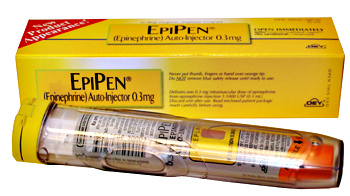We’re only a few months removed from the constant news about Martin Shkreli and Valeant Pharmaceuticals and their price hikes on drugs. On Monday, August 22, 2016, a flurry of senatorial activity was taking place revolving around Mylan Labs and its popular prescription, the EpiPen. Senator Amy Klobuchar requested the U.S. Federal Trade Commission investigate price hikes taken by Mylan, and asked the Senate Judiciary Committee to investigate the same.
At the same time, Senator Richard Blumenthal wrote to Mylan Labs, asking for data about its patient assistance programs and demanded that Mylan lower the price and Senator Chuck Grassley sent a letter to Mylan Labs, asking for pricing data on the device.
All of this activity came after reports by STAT that Mylan raised the list price of EpiPens by more than 450 percent since 2004 (after adjusting for inflation) and that a pack of two EpiPens currently costs over $600, when in 2004, that same cost – in today’s dollars – would be roughly $100.
Part of the reason for the large jump in price came in 2015, when Mylan raised the list price by fifteen percent twice, in part likely because of the lack of competition. Last fall, Sanofi recalled its own injector due to dosing problems and Teva Pharmaceuticals failed to win regulatory approval for a proposed injector last spring.
This issue gained traction for a few reasons. First and foremost, the issue of rising prescription drug costs has been part of the national conversation for over a year – the presidential election, politics as usual, and Valeant and Turing Pharmaceuticals have all worked together to make high drug prices a commonly-discussed issue.
The EpiPen controversy has blown out of proportion, perhaps in part, also because this is not the first price hike of which Mylan has been accused.
Klobuchar Letter
Senator Klobuchar suggested the FTC look at whether Mylan has used incentives or exclusionary contracts with insurers, distributors, or pharmacies to deny alternative products access to the market. She noted at least one other autoinjector, Adrenaclick, is available. But while it is less expensive, sales are “minimal,” presumably because insurance is spotty, she wrote. “There may be benign reasons for EpiPen’s market success, but the FTC should consider other potential explanations,” she maintained.
Grassley Letter
Senator Grassley noted that it is likely that it wont just be parents with children who suffer from allergies that will feel the pain from this price hike. “The cost of an EpiPen prescription has implications for the federal taxpayers, as well,” he wrote to Mylan Chief Executive Heather Bresch. “Over 40 percent of children are insured through Medicaid or the Children’s Health Insurance Program. It follows that many of the children who are prescribed EpiPens are covered by Medicaid, and therefore the taxpayers are picking up the tab for this medication.” Senator Grassley asked for answers to several questions, including focuses on advertising and what analyses were done by Mylan in determining the price of the EpiPen.
Blumenthal Letter
Senator Blumenthal, on the other hand, focused on challenging Mylan to provide information about its co-pay card, which he claimed maxes out at $100 and asked the drug maker for details on how patients can cover the balance of the cost.
Mylan Response
Initially, Mylan only responded to the Klobuchar letter, writing that that the drug maker sponsors several programs to increase access, including a patient copay card that the company maintains helped nearly 80 percent of those with commercial insurance receive EpiPen for nothing. Mylan also says it has donated autoinjectors to schools — approximately 700,000 since 2013 to about 65,000 schools.
Several days after the constant media storm, Mylan announced that it will increase the amount on a copay savings card from $100 to $300 and expand eligibility criteria for patients who can receive the drug for free.
Several days after that, Mylan announced that they were working on a generic version of the EpiPen at a price point of $300.
What Does This Mean?
The initial outrage, the Congressional involvement, and the eventual “giving in” by Mylan may signal what is to come in the future. Valeant and Turing Pharmaceuticals did the industry no favors when they dismissed the press and Congressional concerns in such a nonchalant fashion (remember Shkreli “testifying” before Congress?).
Mylan may be the first to show that more serious pharmaceutical companies are forced to respond to Congress and negative press in a meaningful way, such as by quickly coming up with a pricing solution. However, as more and more generics come to market, the laws of economics will step in and alleviate the ability of name-brand manufacturers to keep their prices high.

